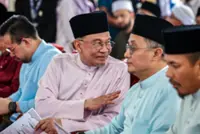
State Education, Innovation and Talent Development Minister Datuk Roland Sagah (centre), flanked by his deputy ministers Datuk Francis Harden (left) and Dr Annuar Rapaee, at the state assembly in Kuching. - ZULAZHAR SHEBLEE/The Star
KUCHING: The impact of the dual language programme (DLP) in Sarawak schools can only be fully assessed once the first batch of students reaches Form Four, says Datuk Roland Sagah.
The state Education, Innovation and Talent Development Minister said this was because the students would be streamed into Science and Arts classes in Form Four.
"Now we are only up to Year Four because we started the DLP in 2019. So, it's too early to tell but we hope for the best," he told reporters after delivering his winding-up speech at the state assembly here on Monday (May 22).
In his speech earlier, Sagah said Science and Mathematics were taught in English at all 1,265 primary schools in Sarawak under the DLP.
He said Science and Mathematics teachers as well as non-option teachers were selected for training based on their competencies in English.
"Pertaining to the non-option teachers, they are selected based on their background in Science and Mathematics,” said Sagah.
"The state Education Department deems that they are suitably qualified to teach Science and Mathematics, despite not specialising in these subjects," he added.
Sagah said in some isolated cases, especially in low-enrolment schools, a small number of non-option teachers without Science and Mathematics background were selected to teach the DLP.
"We do not want students at these schools to be left out. In this case, we must congratulate the teachers for accepting the challenge," he said.
Sagah also said the teachers were monitored and assessed by the Education Department through a special task force.
He added that to date, the task force had made 1,101 assessment visits to schools, involving 3,111 out of 5,200 teachers trained for the programme.
"As the programme progresses to Year Six, more teachers will be involved," he said.
He added that the Sarawak DLP was a state initiative fully funded by the state government, with RM15mil spent on the training programme so far.
On education autonomy for Sarawak, Sagah said this was limited to Paragraph 17 of the Inter-Governmental Committee (IGC) Report 1962.
He said Paragraph 17 does not grant full education autonomy to the state but sets conditions for the use of English and Bahasa Malaysia, religious education and the special position of the indigenous people.
"It also affirms the need for the Sarawak education director to consult and seek advice from the state government and allows for local authorities to continue as agents for primary education.
"Pertaining to higher education, Paragraph 17 stipulates the need for Sarawak to be given special consideration in the expansion of facilities," he said.
Sagah said his ministry was working with the Malaysia Agreement 1963 committee to pursue the matter of education autonomy.
"We will not seek anything more or less than what has been stipulated in Paragraph 17 of the IGC Report," he said.










































